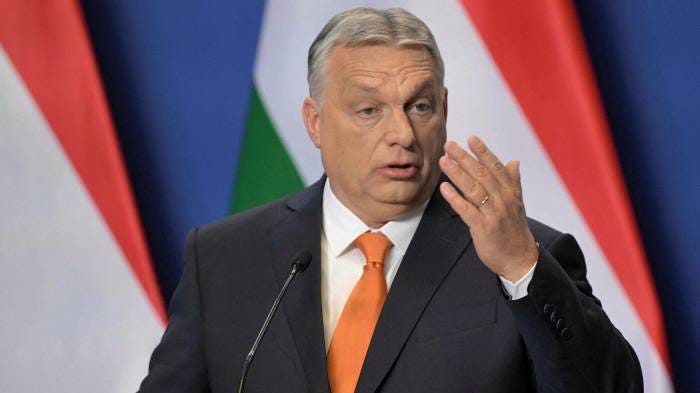First Draft #18: a newsletter on public language
Underdogs; Twitter and Musk; is Ukraine winning the info war?
Big vs Smalls: Amazon’s underdog
“He’s not smart, or articulate”. That was the verdict of a top Amazon lawyer, two years ago, when Christian Smalls organised a walk-out at one of Amazon’s notorious ‘fulfilment centres’ in Staten Island.
But in disparaging him, Amazon had made a fatal mistake. Smalls became the ultimate underdog. Over the coming months, he spent every day at the local bus stop, giving out free pizza, doughnuts, and home-cooked meals to Amazon workers. He built bonfires to warm colleagues waiting in the cold. He made TikToks, and signs offering “Free Weed and Food”. All the while, he collected union signatures.
And it worked. Last Friday, his warehouse voted overwhelmingly to unionise, and Smalls became president of the first Amazon union in history. “Amazon wanted to make me the face of the whole unionising efforts against them,” he tweeted. “Welp, there you go!”
What made Smalls so persuasive? Was it persistence, timing, or just good luck? In Lawrence Freedman’s account of David and Goliath, “David had God on his side”. For Malcolm Gladwell, “David was a highly skilled slinger.” Smalls had a different advantage: his story.
As anyone versed in rhetoric knows, people can’t resist an underdog. We cheer on Rocky Balboa, the Karate Kid, Slumdog Millionaire. We root for unlikely sports teams, political candidates, even brands. It’s one of the oldest rhetorical devices, a version of Aristotle’s peripeteia, designed to give a huge emotional payoff when the unlikely hero wins the day.
There is no consensus in psychology about why underdog stories captivate us. Some think we’re driven by envy, and an innate desire to see the successful fall. Others say we have an ‘upward mobility bias’ – we secretly believe we’re among the 1% destined to live the American Dream.
Good underdog stories often have a crucial ingredient: justice. We don’t just want the downtrodden to succeed, we feel it’s right. In his book, The Belief in a Just World, the psychologist Melvin Lerner explains that when humans witness suffering, we instinctively learn to cope by cultivating optimism. The underdog must win the day – anything else is too depressing.
For Smalls, the strategy has worked so far. But once an underdog succeeds, support often tapers off. We need only read past David’s defeat of Goliath to uncover the harsh reality. Having become King, David ends up betrayed by his son, ousted by a coup d’état, and forced into exile.
Despite the media euphoria, Smalls now faces the legal might of Amazon to overturn the legitimacy of his election. And if he survives that, he will enter negotiations that will likely stretch on for months, with no guarantees of better pay, benefits, or working conditions. The truth – in sports, as often as business – is that underdogs almost always lose in the end. Smalls has won the battle. Now he must prepare for war. @_alice_elliott
All that Twitters
Elon Musk describes himself as a "free speech absolutist" and he certainly believes absolutely in his own freedom to speak (though whether he believes in the free speech of others, particularly his own employees, is a thornier question...).
The news that Musk has bought $3bn of Twitter shares, making him the company’s largest shareholder, is therefore notable. Just days before, Musk tweeted: “Given that Twitter serves as the de facto public town square, failing to adhere to free speech principles fundamentally undermines democracy. What should be done?”
There is a reasonable disagreement to be had on the question of free speech on social media. To some, Twitter gives voice to the voiceless. To others, it is home to abuse and misinformation. Where one man sees the Greek Agora reborn, another sees mediaeval stocks in the town square.
The barriers to Musk actually changing Twitter may be more prosaic than philosophic, however. “Large advertisers don’t like toxic environments,” wrote one analyst this week. If Musk makes Twitter (even) rowdier, his fellow shareholders might soon have reason to oppose him. @joshuahwilliams
Jargon buster: Core
Comms agency Hand & Heart set up an online platform to help BrewDog with its “core mission of tackling [the brewer’s] cultural issues”. “Core”, like its cousin, “key”, can almost always be deleted. Writers rarely need to emphasise that the things they’re saying are central, or important, as this is implied by the fact they’re writing them. If someone talks of their values, one does not think “but what are your core values”. The same is true of “missions” and “strengths”. These are “core” by nature. I suspect people use the word to convey a sense of getting to the heart of things. But really its use betrays an affinity with the earth’s core: it makes you sound incredibly dense. @AlexDymoke
Orban’s democratic impression
The speech of the week was undoubtedly Viktor Orban’s victory address after his fourth term in office as the Prime Minister of Hungary. Orban claims to represent an illiberal democracy. If that term had any meaning then Mr Orban’s speeches would still matter. Tyrants do make speeches but their purpose is merely to inform or to command. It is only in a genuine democracy that the function of a speech is to persuade.
Orban is a would-be tyrant who wears the garb of a democrat. His post-election rant identified six enemies that he claimed to have vanquished. The miscreants were the Hungarian left, the international left, the bureaucrats of Brussels, the Soros Empire and its money (read “the Jews”), the international media and (a new entry in at six) Volodymyr Zelensky.
It was a preposterous and melodramatic performance which called to mind, strangely enough, Isaiah Berlin’s book Freedom and Betrayal: Six Enemies of Human Liberty in which Berlin named Helvetius, Rousseau, Fichte, Hegel, Saint-Simon and Maistre as the guilty men. There is another name we could add to that list. The most conspicuous enemy of human liberty who still pretends to be a democrat — Viktor Orban himself. @PhilipJCollins1
Is Ukraine really winning the information war?
No one knows what will happen in Ukraine, or how long the conflict will last. On the information front, however, victory was declared weeks ago. Zelensky’s khaki clad charisma. AK-wielding nursery teachers. Tank-defying protestors in Kherson. Such images have defined the war and made Ukrainian pluckiness its most striking narrative feature.
Or so it seems here in the West. On 2 March, Carl Miller, director of the Demos Centre for the Analysis of Social Media, noticed two trending hashtags (#IStandWithPutin and #IStandWithRussia) that he suspected were part of a coordinated information operation. He looked into them and, sure enough, found a vast international network of accounts all boosting the topic at the same time.
Most noticeable, writes Miller in a new whitepaper, was their location. The twitter accounts, many of which appear to be bots, cluster around Nigeria, South Africa, China, Iran and India. On the day of the invasion there was a small uptick in activity. The biggest spike, however, came on 2 March, just before the crucial UN vote on whether to condemn the invasion.
As well as the above hashtags, the network had been pumping out memes riffing on Western hypocrisy, Russian strength and solidarity among BRICS. One meme shows a picture of Obama, Bush and Clinton with the caption “During 23 years these three invaded 9 islamic countries and murdered 11 million muslims and nobody called them terrorists”.
To know who is winning the information war, you need to know where it is being waged. Zelensky’s heroism has rallied the West behind the Ukrainians. But what if Putin was happy to cede the narrative here, and hoped instead to inspire an anti-Western global movement. If that was his aim, it seems he has had some success. This chart shows two thirds of the world’s population live in countries that are either neutral or sympathetic to Russia.
Miller’s research is a reminder that the narrative forming before our eyes is one of many. “A mistake we make in the West,” he writes, “is to suppose that our information spaces are far more universal than they are.” This was true of Remainers during the Brexit vote and Democrats pre the 2016 election. It is likely true of the Ukraine conflict, too. So, next time you gaze approvingly across the information battlefield, remember: you may be looking at the sprawling reaches of your own echo chamber. @AlexDymoke
Language and beyond
The brilliant Peter Pomerantsev reflects on the country of his birth: “[Ukraine] contains many histories simultaneously: the Russian, Soviet and Austro-Hungarian empires, Poland, Romania and, of course, Ukraine itself. This lattice of historical narratives has made many in the West feel as though the country is not quite real.”
When Putin invaded Ukraine, many said Marine Le Pen would be undone by her links to Putin. In reality, war in Ukraine may be more of a problem for Macron. As French polls tighten, it’s worth reading this NYT piece on France’s lurch right.
Elegiac memories of a more hopeful Russia – “The Russia We Have Lost” – from Ben Judah.
Grateful to Rosa Lyster for posting this wonderful poem by Jack Gilbert, which I hadn’t seen before. The poem prosecutes an argument that at first seems bracingly callous. But as it gallops on I find myself swept up in its logic. I love the ghostly harbour scene at the end.
“There seems to be less fiction in the 21st century that takes substance abuse as its major theme, but the topic has also never been more closely examined than it is now.” Where have all the addict artists gone, asks Michael Miller.
Larkin on Spring.
“Firms of more neurotic and extroverted CEOs tended to experience higher levels of stock volatility, but were less able to translate this high risk into higher shareholder returns” A fascinating study into how CEO personalities affect company share price.
Can changing the channel change a person’s politics? US academics studied the effects of switching from Fox News to CNN over a single month. It found even the most committed Fox viewers became more sympathetic to “liberal” arguments over that period. A counter to the idea that, in an age of identity politics and culture wars, no one is persuadable.
New from us
Josh on Europe’s quest to break open Big Tech.
Phil defends Laura Kuenssberg’s record in the New Statesman.
Follow us
Last thing…
At The Draft we’re specialists in writing and rhetoric. We help businesses and public figures make their case more persuasively. If you could use our help, get in touch. And if you enjoy First Draft, forward it on. Thanks for reading.






